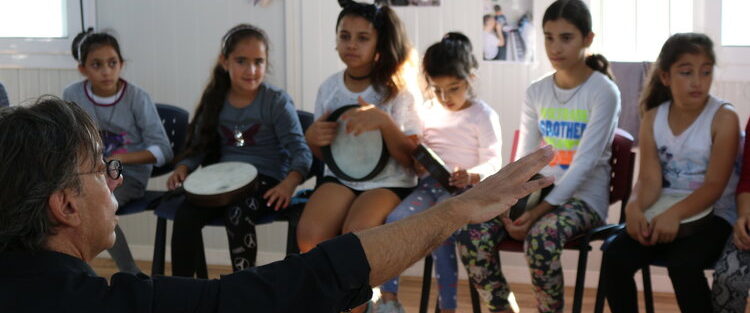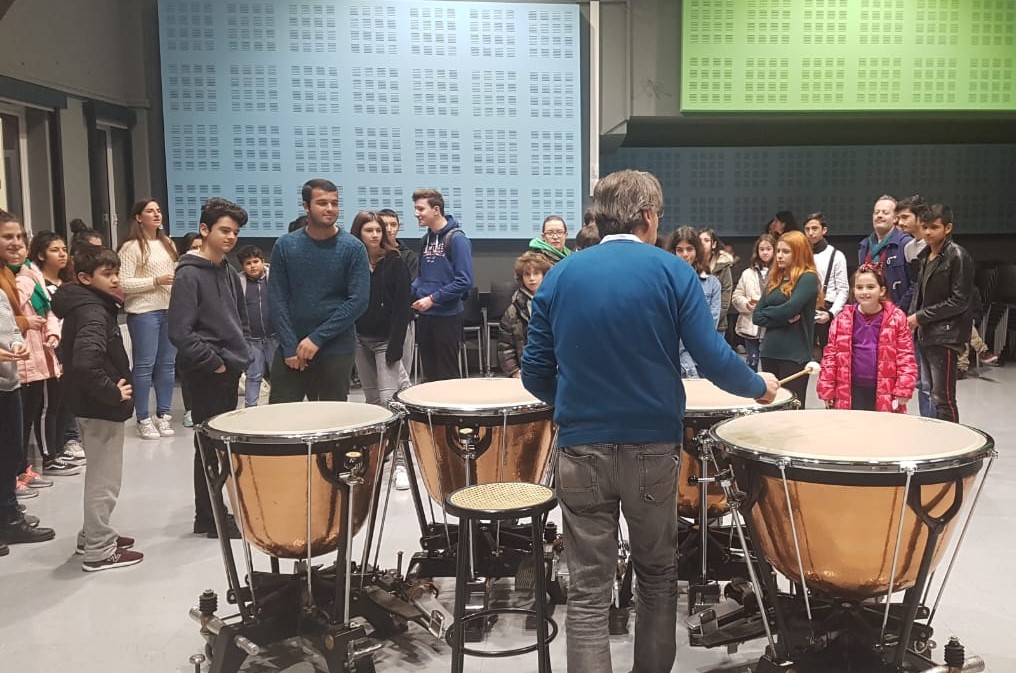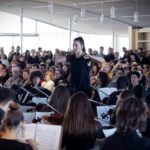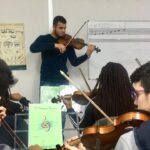Panayiotis Tsirides is the Pedagogical Coordinator of El Sistema Greece since 2017. His role is to support the teachers and work with them to continuously adapt our programs to Greece’s changing environment. Alongside our Artistic Director he works to design our overall pedagogic approach. What are the difficulties and the educational goals of ESG? How important is it for our students to participate in concerts? Panayiotis gives answers to all these questions below.
El Sistema Greece currently operates in 6 locations in Athens. Skaramagkas and Elaionas Refugee Camps are two of them. Which are, in your opinion, the difficulties that the teachers face in these nucleos?
On a more practical level, the basic difficulty is language. Most of the time the youngest refugee children speak only their mother tongue which may be Arabic, Farsi or other. During the classes there is always a translator who makes the lesson accessible to all. This is of course necessary but as you can imagine, the communication between the teacher and the students is not direct. Another barrier -of course- is that the population in the camps is always on the move. New children arrive all the time and must start from the beginning while others that have progressed have to move to another camp or even to another country. It is important for teachers to develop skills which help new children integrate into the existing group as quickly as possible while at the same time keep the interest of old students high and improve their musical skills. On a psychological level, one could say that all teachers who work with refugees or traumatised children inevitably face an internal journey. An ESG class might seem ideal to an outside observer due to its elements of play and positivity, however, the child trauma connected displacement is always present and the teacher must be equipped in order to accept it, process it and bear it.
What is the main difference of the El Sistema model? In which ways does it differ from the classic way of learning music and which are its goals in terms of pedagogy?
The students of El Sistema Greece, who come from different countries with different experiences, sing and play music on a daily basis, they build relationships and learn to accept each other. This is tangible proof that music is a common language. Do you think that music is a powerful enough tool to improve the world? Can music change the life of a child?
Regarding your first question, the answer is simple. From the moment children and youth come together to create and make music with peers that are more often than not very different to them, they start developing ethical principles and moral values. They become active members of a small community called orchestra and in the long run, members of the wider community they live in. They learn to respect their fellow musicians and their conductor not because they are forced to but because they understand that this environment provides them equal rights and fairness. Similarly, as citizens they will be able to respect human rights. As members of an orchestra, they put much effort into achieving a common goal: a high quality musical result. The same effort they will have to put in later on in life in support of justice and their fellow citizens. I believe that this kind of responsibility could change the world for the better. As far as your second question is concerned, whether music can change lives, I would rather refer you to the thousands of testimonies of those who received their music education at El Sistema in Venezuela or any other Sistema (inspired) programme in the world. Most of them did not pursue a professional career in music however their experience at El Sistema shaped their characters and -as they say- drove them to a creative life.
The students of El Sistema Greece perform at some of the best music venues in Athens, receiving comprehensive music experiences. Does their participation in concerts motivate them to join the project?
Every child has its own personal motives for joining El Sistema. During the classes students meet with their peers and play music. Perhaps they would still attend classes even if they didn’t take part in concerts at famous music venues such as the Odeon of Herodes Atticus, the Greek National Opera (at SNFCC) or the Megaron–Athens Concert Hall. There is no doubt, however, that taking part in a performance gives them the chance of experiencing a comprehensive production (from the reading of scores to the sectionals and the tutti rehearsals to the general rehearsals on the stage and -of course- the concert). A big show also gives them the unique opportunity to meet professional musicians on stage and have someone to look up to. These experiences strengthen a child’s drive to study harder and urge them to continue their music studies. At the same time, concerts help them to grow and mature as standing in front of a crowd means that they take on double responsibility being responsible not only for themselves but for the entire team.





